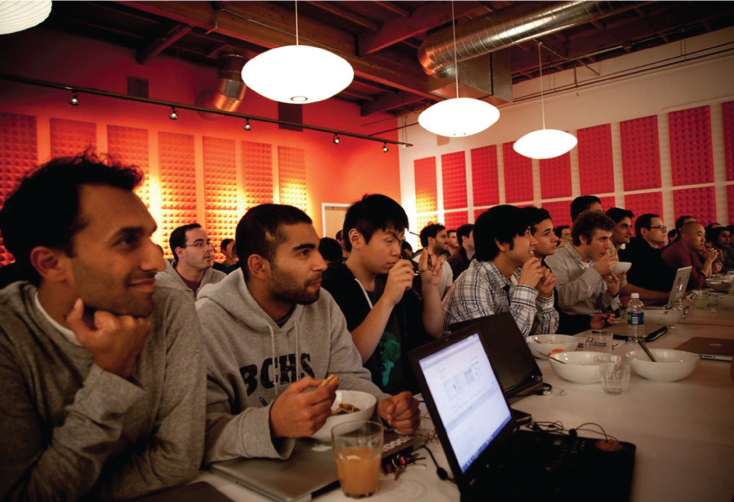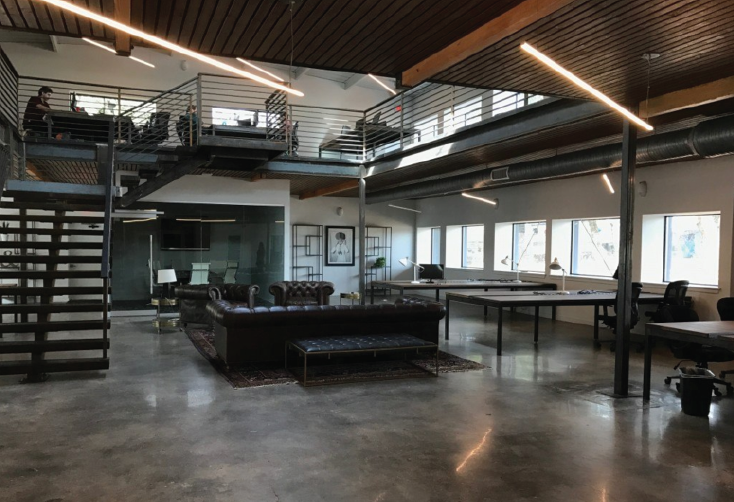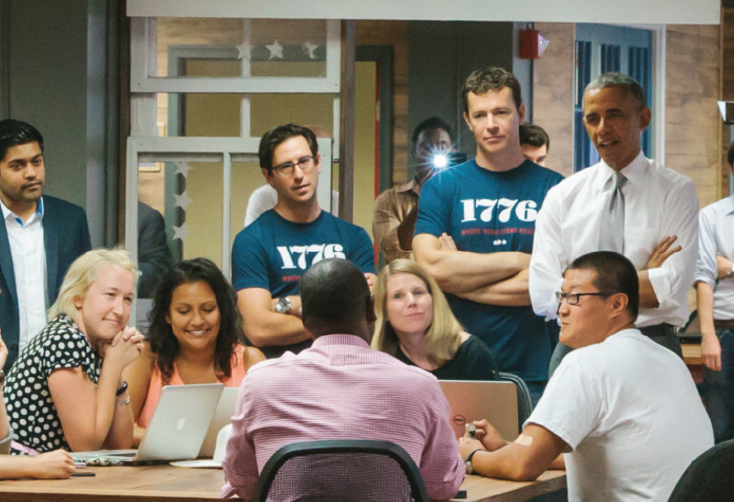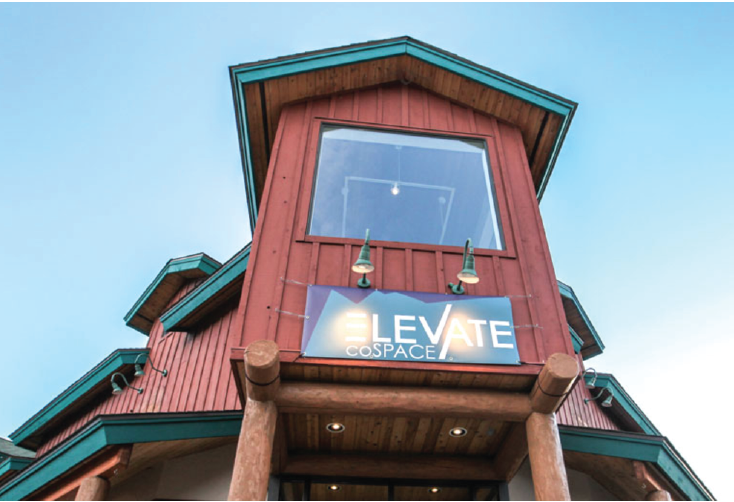Coworking spaces, accelerators and incubators are all vying for the attention of startups. Each option offers real advantages for a fledgling business, but it can seem impossible to decide which one is the right choice.
So, you may decide to stay in your home office or fork out for a traditional office space. These options also bring pros (and cons) to your startup. For example, the home office is free to use (but may not be the professional space your clients expect) and a traditional office will provide the facilities and space you need (while tying you into an expensive rental agreement).
But coworking spaces, accelerators and incubators offer viable alternatives. All three have seen a surge in popularity as startups crave the flexibility and opportunities each one offers.
Let’s find out more about these different working environments and which one your fellow startup founders would recommend.
Coworking, accelerators and incubators: what are they?
Coworking spaces come in all shapes and sizes, with an estimated 14,000 spaces around the world. NYC-based The Farm Coworking defines the coworking ethos as: “a community of like-minded individuals who work together in the same space to collaborate and grow.”
A coworking space will give you a desk or a dedicated office that you can rent as and when you need to. You don’t need to offer any equality in your business and you can rent more space as your startup grows.
Many coworking spaces also offer advice and mentorship to startups through dedicated services, events and networking sessions.
Accelerators and incubators are very similar programs that will help you grow your business through mentorship and funding opportunities.
Incubators are for startups in the early phases of setting up. They focus more on mentorship, do not operate on a set schedule and are usually run by industry-specific companies and groups. The Idealab is a long-standing tech incubator that has created more than 150 companies. Some incubators also offer startups a shared space in a coworking environment and most ask for a cut of your equity.
Accelerator programs operate on a set schedule and offer mentorship to improve your startup’s growth. Most are very competitive with Y Combinator only accepting just 2% of the applications it receives, for example. If you’re accepted onto an accelerator, you’ll get a small seed investment and access to a large mentor network – but you’ll have to give up a small amount of equity in your business.
 The Y Combinator.
The Y Combinator.
Which one should you choose?
The choice between a coworking space, accelerator and incubator will be very personal to you and your business. It depends on your start’s maturity and your future plans. We spoke to fellow founders to find out which option (or options) best worked for them.
Coworking offers structure, space and flexibility in the early days
Coworking is a natural first step for many startups. Alex Valentine, co-founder of 121with, has just taken on a coworking space at Runway East Finsbury Square.
Valentine explained: “We needed a place to interact beyond coffee shops and a space that promised a lively buzz and a first home for the business. Runway East has a great location with meeting rooms, excellent facilities and a craft beer never far away.”
Brian Clark, CEO and co-founder of Ascent Technologies, said: “We are located at WeWork on Michigan Avenue. We chose this location due to the flexibility and the support they provided to a growing business and the proximity to our customer base.”
Clark added: “The key benefit is outsourcing the overhead and administrative burden of managing physical office space to experts at a reasonable price. Our resources and time are best spent growing our technology and being obsessed with our customers. Working in a coworking space allows us the ability to stay laser-focused on our clients, products, and market opportunities.”
Aerial drone services startup Dronegenuity has seen rapid growth since it launched last year. It reached the point where it needed to increase employee headcount to keep up. So, it moved into a coworking space in Hudson, MA to accommodate new hires while avoiding locking the company into any long term commitments.
Dan Edmonson, founder and CEO at Dronegenuity, said: “For us, and for most startups, the future is pretty unpredictable and early commitments don’t seem very sensible. We pay rent month-to-month and could pack up and leave tomorrow without any serious damage. Additionally, the space we chose is also home to marketing and technology companies that have provided great networking and collaboration opportunities.”
Elliot James and Dalton Tracee, founders of Pure Apartment Locating & Design, said: “In starting up our company in Austin, Texas, we had to make the decision early on, to either work from an incubator, accelerator, or a coworking space. For us, our decision was simple. We were looking for a space that would give our team a paramount sense of community, which has allowed us the ability to spontaneously collaborate with other companies outside our realm of expertise.”
“Our company was also on the hunt for an environment that would add a huge sense of work culture to our startup. No extra funds were needed, nor mentorship. Simply a place that would allow our creative potential to blossom. That is why we chose the atxFACTORY as our coworking space.”

The atxFACTORY
Variety is the spice of (work)life with coworking
If you choose to try coworking, then there are plenty of different spaces to choose from. Ryan Angilly, CEO at social media cleaner Scrubber, has worked in four different coworking spaces across Colorado. He said: “The biggest thing that I look for in a coworking space is a combination of variety and privacy. Variety simply means that the coworking space is vibrant: lots of members, foot traffic, events, local places to eat and drink, and so on.”
Claire McTaggart, founder at HR tech startup SquarePeg, said: “We were at TechSpace, but they don’t allow flex space users to stay after 6pm, which isn’t realistic for any startup. Coalition (MicroOffice) was fantastic from a pricing and flexibility standpoint, we had an alcove and so it was easier to have team members and meetings without always coordinating day rates and space.”
“We are now at Grind FiDi, which has coffee and other amenities, and we are getting a good rate through this incubator. The location isn’t as great as the ‘Silicon Alley’ spaces in Flatiron, but that isn’t our number one priority.”
Working with others can get tough
Losing the silence of your home office can be a double-edged sword. CEO and co-founder of conversation transcriber and analyzer VoiceOps Daria Evdo said: “For us, the largest drawbacks to shared spaces are not being able to have as cohesive an office culture as you would with your own space. Even if you try not to, you self-censor in an open environment. People tend to act more subdued (in part to keep the noise level at a manageable level) which is what leads to so many coworking spaces feeling sterile.”
Losing the silence of your home office can be a double-edged sword. CEO and co-founder of conversation transcriber and analyzer VoiceOps Daria Evdo said: “For us, the largest drawbacks to shared spaces are not being able to have as cohesive an office culture as you would with your own space. Even if you try not to, you self-censor in an open environment. People tend to act more subdued (in part to keep the noise level at a manageable level) which is what leads to so many coworking spaces feeling sterile.”
VoiceOps is currently using the Salesforce incubator space in San Francisco on 7th St, which is free of charge for participating companies. The startup has also worked from coworking spaces, its own dedicated offices and took part in the Y-Combinator accelerator.
Scrubber’s Angilly agrees that working in a shared environment has its drawbacks, he added:
“The ability to have privacy is also paramount. After a while, sitting in the main hall with your laptop can get very distracting.
“To be blunt: newer members are high energy and want to talk a lot about how they’re ‘crushing it’. That kind of thing can be draining after a while. Having a private or semi-private work space away from common areas is extremely important.”
Unlike coworking spaces, accelerators and incubators can lack collaboration
Finding the right balance between collaboration and competitive edge can be difficult across all three spaces. Yasmin Mattox, founder and CEO at working women’s support startup Arkatecht, said: “Accelerators and incubators are great because of the built-in counsel and workshops typically offered, but to their disadvantage, I’ve also generally found a comparative lack of interdisciplinary collaboration that I’d not only appreciate, but also need for the nature of work my company is doing.”
“I love high tech, but my company would also benefit from being exposed to low tech companies too. Innovation is not limited to a particular sector. So, I need and want a space that’s not just for high tech or low or no-tech. In that respect, coworking space looks like it just may be the winner, but I think there’s an underlying argument to be made for a hybrid offering I have yet to find that brings together people from various fields in a way that can also support high tech and all of the tech ventures in between,” she added.
Mark Valderrama, founder of SEO company Velvet Cloud, said: “I got tired of working at home with all the various distractions and comforts there. I did look at incubators and accelerators, but what I noticed is that these spaces tend to cater to either tech or large corporations. I was looking for more of a close-knit or tribal community. I visited multiple spaces in town and fell in love with this cool looking space on the East Side of Austin called atx FACTORY.”
“What I loved most was there were multiple companies there that were not tech companies. There were real estate agents, e-commerce companies, lawyers, broadcasters, a catering company, and freelancers. Most of these companies were bootstrapped – and as a bootstrapper myself this resonated with me. I had a common bond with these members. The connections I have established working in this space have been priceless and will last a lifetime,” he added.
Working with like-minded people helps your startup
Collaboration and project management software startup Yakk is part of the Entrepreneurial Spark programme, which offers shared office space in Dundonald, Scotland. Peer-to-peer learning is one clear advantage to this set up as Michael Docherty, CEO & Founder of Yakk, said: “Any problems I have come across while getting my company off the ground have already been experienced by someone in the building. Everyone has something to offer the other entrepreneurs.”
The positive environment and networking opportunities are also vital for Docherty’s business: “Everyone in the space is an entrepreneur with a growth mindset. They are all very positive people and I feed off that. It’s brilliant when you have an off-day.”
“There is also a good chance that someone knows a person that can help me. In fact, recently one entrepreneur had supplier problems and another entrepreneur put her onto a different supplier within hours,” he added.
VoiceOps founder Evdo added: “The upside [of coworking] is usually cost savings, which can be pretty beneficial for Bay-area startups looking to avoid spending $10k+ per month on office rent. Shared knowledge is another benefit, but the level of interaction between startups in a coworking environment varies drastically. We’ve experienced offices where people share ideas and resources, and others where companies typically keep to themselves.”
Accelerators and incubators offer funding – but cut into your equity
If you need a cash injection for your startup, an accelerator or incubator is the way to go. Terry Kim, CEO and Mentor at NexGenT, said: “We wanted to get into a top accelerator in the US to increase our chances of raising a seed round. It allowed us to build a network in the valley, raise a small round, and move out here to recruit and build out our team. AngelPad is considered one of two in the highest platinum plus tier in the latest rankings.”
A consequence for the vast majority of accelerators and incubators is that you have to give up a share in your startup. Allie Frownfelter, founder at Bottle Thread, said: “Since Bottle Thread is a sustainable fashion company, I needed a place to meet with prospective wholesalers and share a legal team. Incubators and accelerators are good for this, but they usually require you to give up about 5% equity. While it doesn’t seem much to get started, the percentage can be a hindrance later on when you’re trying to expand or sell more equity. It’s definitely not for everyone.”
SquarePeg’s McTaggart said: “In terms of incubators and accelerators, there is always a trade-off – what value can they deliver that you wouldn’t be able to generate yourself, and is that worth the equity in your company? I started at Founder Institute (FI), which has an interesting equity pool where all founders have an option on equity in each others companies, and mentor equity options are tied to their ratings from founders, which really incentivizes people to support each other. Unfortunately, FI has no physical workspace though which is why it is really for early stage entrepreneurs.”
“Currently, we are in the first cohort of the Monarq Incubator for female founded tech companies. Monarq provides a huge network of mentor support, as well as a coworking partnership with Grind, without asking for any equity in return (which is rare to find these days).”
Incubators bring confidence and connections to your startup
Incubators offer startups vital business resources, as Georgina Castanon, CEO at tourism planner Walk and Explore, said: “For us, it was a very simple decision. We have a small office in Manhattan but when the opportunity to work out of the CSI Incubator in Staten Island came up the decision was made. CSI incubator helps us with office space and resources, as well as interns, mentors, etc. It is a place where we not only have a great location but we feel that we receive business resources (networking etc) that can help our business grow.”
Trey Gordner founded his library marketing startup Koios in Columbia two years ago. When he moved to Washington last Fall, he evaluated the local coworking and incubator scene and chose the 1776 incubator for its connections, community and cost.
 The 1776 incubator
The 1776 incubator
Gordner explained why he chose this particular incubator: “1776 is the foremost name in startups in the DC, Maryland and Virginia area. That prestige, plus the deep networks of 1776’s founders and advisors, opens doors for us in this city. Especially with me being new to the area, this access is critical for our company’s success.”
“Expert mentors also lead frequent workshops on common startup challenges such as funding, product, team, sales, etc. And if I need individual help, I can always book an office hour.”
“Part of the 1776 package includes communal meals twice a week and after-hours events. I worked out of an incubator for two years prior to 1776 and couldn’t name three fellow founders there. At 1776, I’ve made fast friends who can relate to startup life and advise me as peers,” he added.
Creative agency Kapowza currently resides at the Emerging Technology Center incubator in Baltimore. Founder, Dan Schepleng said: “Being in this space, we were able to meet some amazing companies and make connections that otherwise would have required a dedicated networking event schedule. It also brought us a sense of stability in the early days of the company. Having an office, even if it’s just a desk, stabilizes a lot of your thinking and schedule. I think the company would have grown half as fast if I started out working from home.”
Accelerators will help you develop your ideas
Accelerators are more suited to startups trying to reach maturity, as Courtney Wilson,
founder and CEO at veteran support company DropZone For Veterans, explained:
“We were specifically looking for an accelerator rather than an incubator or coworking space because we are at the point in our business where we’re beyond the idea stage, but we’re not quite far enough along where we’re at a steady-state and just need a place to work out of.
“We wanted to be in a place where the focus wasn’t on fleshing out an idea, or maintaining the business, but really on executing and making forward progress.”
DropZone For Veterans chose the MassChallenge accelerator. “Not only is it consistently ranked as one of the top seed accelerators in the country by the Seed Accelerators Ranking Project, but they’re actively committed to supporting female entrepreneurs through their EMPOWER@MassChallenge initiative and their Women Founders Network, and have a proven record of supporting veteran entrepreneurs,” she added.
“Being in MassChallenge has already been amazing for our business. Within the first week, we won $5,000 through the Microsoft Civic Innovation Scholarship, had a meeting with USAA Innovation Labs, talked with the three-star General in charge of the Joint Improvised-threat Defeat Agency about how to best support our troops, and secured an interview with NPR. Where else could that happen?”
Ladies: Consider a female-only space
Female-only coworking spaces have also proved beneficial to Nichole MacDonald, founder and creator of Sash bags.
She said: “When I launched my company, I found out quickly that it was still very much a “good ole boys” club in the finance and business world. I found my tribe at Hera Hub, a female coworking space in San Diego. There I feel supported and valued. I have grown my company from inception to a multi-million dollar brand with the support from Hera Hub. That was not in place of incubators. I have done them simultaneously.”
“When I first came up with the concept for my product, I joined Hera Labs, which is an educational arm of Hera Hub. The incubator was called Idea Potential Lab, which was a five-week course to make sure you have a viable product, marketing plan, and strategy to successfully execute your startup. I left with a good plan and successfully launched my company.”
“I will be starting an incubator with Seed San Diego later this month to launch that business. At this point in my entrepreneur career, I have learned how valuable leadership and support are. I have tried launching things on my own and failed. And I have tried launching through an incubator and succeeded. So it’s not even a question about if I will join an incubator, it’s which one is right for my idea,” she added.
Startups can use all three
As a startup, you don’t need to stick with either a coworking space, an accelerator or an incubator. You’ll probably need all three at some point in your startup journey.
Cost is a key consideration for startups, as Arkatecht’s Mattox explained: “I am currently deciding between coworking, accelerator, and incubator spaces in Rochester, NY. I have a tech startup that is very much all about expenses and certainly not yet about revenue since we are working on developing our product. As a result, the greatest factor in my determination is cost – even though that may be an unromantic answer.”
The founders of interactive print, digital and video book company InMotion Albums, Kristin and Lucas Miller, have worked in coworking spaces at Elevate coSpace as well as the Hyperaccelerator offered by Rockies Venture Club. Kristin Miller said: “Our decision to lease space or join startup programs with expert mentorship resources has always been contingent on our business needs at the time and the milestones we need to achieve going forward.”
“We evaluate our end of year goals as well as our five-year exit strategy. We leverage this evaluation to choose what programs and workspaces will help us execute best to generate the ROI we need,” she added.
The coworking space at Elevate coSpace gives this startup a shared community of entrepreneurs to network with as well as resources in investor and media resources.
Miller said: “We used the space to work smarter, achieving more by giving ourselves a quiet space to work. I recall writing the application for the CES Innovation Awards at 11pm on a Friday night. Our home had guests and sleeping kids, but I didn’t have to rely on finding a quiet space in my home. I utilized our office at Elevate coSpace instead. Elevate gave me that sanctuary to produce results. Our product was later named a CES Innovation Award Honoree in Digital Imaging.”
The Hyperaccelerator program by the Rockies Venture Club was that startup’s first introduction into the dynamic world of venture capital investing. Miller said: “The expert mentorship we received was geared at preparing the necessary documents to get our startup investor ready. We covered exit strategy comps, proforma cap tables, business model canvas, as well as other critical elements necessary in due diligence.”
“Because our product is now taking pre-orders, we are researching potential 12-month accelerator programs that will accept equity in exchange for marketing mentorship and software development to accelerate our sales. We’re still researching accelerators that fit our product’s unique hardware needs as well as give us a reasonable chance of getting accepted.
“The nation’s top accelerator programs, like Techstars and Y Combinator, have high application numbers and low acceptance rates. Shark Tank may also be in our future, it’s a possibility. While we’re making progress, we understand finding expert mentors and resources in our workspaces is a mammoth key to our success,” Miller added.
 Elevate coSpace
Elevate coSpace
Sports sponsorship business OpenSponsorship used to be in the NYU (New York University) Varick incubator in 2015, then moved to San Francisco for the 500 startups accelerator from January to June 2016, before moving to coworking space The Yard. It finally moved into an office space that it shares with one other company at the start of July.
OpenSponsorship founder, Ishveen Anand, explained the decision-making process behind each stage: “The incubator was an awesome first step for us as it was affordable desk space, a support system and other startups in the early stage like us. They would set up investor hours, founder breakfasts and have routine check-ins to make sure we were progressing.”
“The accelerator (500 startups) was a step up from this in terms of the level of support and the amount of push they gave you – the $125K investment was also helpful! Where the incubator was a two-year term, the accelerator was eight weeks and hard work. I also wanted to move to SF from NYC to experience the startup scene out there.”
Ishveen added: “The accelerator really focused on two things: increasing traction and fundraising. Post accelerator we wanted to come back to NYC and debated going back to the incubator, however, I felt that we needed our own office with a door, even if in a larger coworking space, and I felt that we should be moving forward, not going back to something.”
Voice interactive entertainment company Novel Effect has its own 1,100 sq ft private office space and cost played a huge part in the decision to leave coworking.
Matt Hammersley, co-founder and CEO of Novel Effect, said: “We worked out of WeWork in the past as well as being a remotely distributed team. We made the decision to get our own commercial space when we got funding, our team grew (making remote collaborative work more difficult), and the cost for coworking space became more expensive than a private commercial space for our team of about six people.”
Hammersley added: “We used WeWork for two months. We went with WeWork because it offered great amenities, was in a good location, and they offered us a great incentive package to start. We found that WeWork was not a good fit. As a family company creating products for kids and parents, the ‘fraternity’ feel was not the right atmosphere for us.
“We then had part-time memberships at ImpactHub, mainly using the conference rooms for meetings while mostly working from home. We had a wonderful experience at ImpactHub, and only left because we received funding and needed a larger space to accommodate our whole team.”
Teris Pantazes, co-founder of homeowner, handyman, and real estate community EFynch, recently moved from a coworking space to an incubator – the Betamore in Baltimore.
Pantazes said: “The coworking space was chosen because it seemed more unstructured, it was also cheaper. Coming from a traditional office environment, it was a way to have a place to work and mingle with other startups and business people in our area. The fact it was unstructured was somewhat attractive because frankly – we didn’t know what we even needed to start. We were researching and wanted to keep options open.”
“We recently moved to Betamore, which is more of an incubator. The space is nice (just like the coworking space, even in the same building), but offers a more structured environment with classes and offerings to assist on various issues. It’s almost like having a “semi-part time” partner who offers free advice in exchange for rent.”
So, whether you decide to opt for a coworking space, an accelerator or an incubator program, there are plenty of options and benefits to working in any one of these three ways.
What you will get from each one is a level of support beyond your home office or a dedicated office space where you’re segregated from the rest of the startup community. And true innovation comes through collaboration and mentorship at every step of your startup’s journey.


















